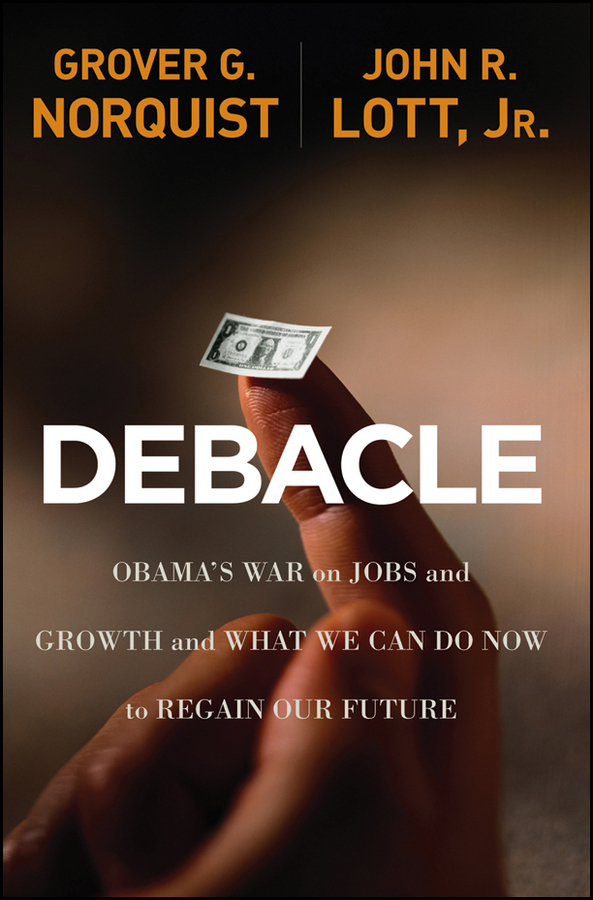Contents

Additional Praise for
Debacle
A sobering examination of the challenges facing all Americans struggling in todays precarious economy. Whether employed, looking for work, or retired, readers will find Debacle a fascinating and insightful examination of governments often misguided efforts at economic reform.
Robert Ringer, Publisher, www.robertringer.com
Like him or not, Grover Norquist is a lightning rod that attracts electricity from all sources. This book doubles the wattage. The tax solutions in this book should be required reading for every member of Congress The surprise may be that members on both sides of the aisle will agree with many of these proposals.
Peter J. Tanous, President, Lepercq Lynx Investment Advisory, LLC; co-author of Debt, Deficits, and the Demise of the American Economy
Copyright 2012 by Grover G. Norquist and John R. Lott Jr. All rights reserved.
Published by John Wiley & Sons, Inc., Hoboken, New Jersey.
Published simultaneously in Canada.
No part of this publication may be reproduced, stored in a retrieval system, or transmitted in any form or by any means, electronic, mechanical, photocopying, recording, scanning, or otherwise, except as permitted under Section 107 or 108 of the 1976 United States Copyright Act, without either the prior written permission of the Publisher, or authorization through payment of the appropriate per-copy fee to the Copyright Clearance Center, Inc., 222 Rosewood Drive, Danvers, MA 01923, (978) 750-8400, fax (978) 646-8600, or on the Web at www.copyright.com . Requests to the Publisher for permission should be addressed to the Permissions Department, John Wiley & Sons, Inc., 111 River Street, Hoboken, NJ 07030, (201) 748-6011, fax (201) 748-6008, or online at www.wiley.com/go/permissions .
Limit of Liability/Disclaimer of Warranty: While the publisher and author have used their best efforts in preparing this book, they make no representations or warranties with respect to the accuracy or completeness of the contents of this book and specifically disclaim any implied warranties of merchantability or fitness for a particular purpose. No warranty may be created or extended by sales representatives or written sales materials. The advice and strategies contained herein may not be suitable for your situation. You should consult with a professional where appropriate. Neither the publisher nor author shall be liable for any loss of profit or any other commercial damages, including but not limited to special, incidental, consequential, or other damages.
For general information on our other products and services or for technical support, please contact our Customer Care Department within the United States at (800) 762-2974, outside the United States at (317) 572-3993 or fax (317) 572-4002.
Wiley also publishes its books in a variety of electronic formats. Some content that appears in print may not be available in electronic books. For more information about Wiley products, visit our website at www.wiley.com .
Library of Congress Cataloging-in-Publication Data:
Norquist, Grover Glenn.
Debacle: Obamas war on jobs and growth and what we can do now to regain our future / Grover G. Norquist and John R. Lott, Jr.
p. cm.
Includes index.
ISBN 978-1-118-18617-6 (cloth); 978-1-118-24047-2 (ebk);
978-1-118-22753-4 (ebk); 978-1-118-26520-8 (ebk)
1. United StatesEconomic policy2009- 2. United StatesEconomic conditions2009- 3. United StatesPolitics and government2009- 4. Global Financial Crisis, 20082009. I. Lott, John R. II. Title.
HC106.84.N675 2012
330.973dc23
2011053434
To Harold Demsetz and Ben Klein, who helped teach me how to apply economics to everyday life.
John Lott
Acknowledgments
Many individuals provided helpful comments and assistance in putting this book together. Among them are Gertrud Fremling, Robert Hansen, Anna Henderson, Maxim Lott, Sherwin Lott, Ryan Ellis, Mattie Duppler, Adam Radman, Christopher Prandoni, Kelly William Cobb, Patrick Gleason, Joshua Culling, and William Upton. Alexander Hoyt, our agent, as well as Debra Englander and her colleagues at John Wiley & Sons, have also been very helpful.
Introduction
The Players
President Obama campaigned in 2008 on bringing the country together, promising to turn the page on the ugly partisanship in Washington. On many issues, he campaigned as a sensible moderate and even repeatedly advocated conservative positions such as cutting the size of government spending and deficits.
But once in office, he took a hard left turn: overseeing a massive 21 percent increase in federal government spending from 2008 to 2011. Creating the largest deficits that the United States had ever seen, with virtually every possible project on Democratic wish lists getting funding. Generating multibillion dollar wealth transfers to unions. Unleashing a flood of new regulationsa 40 percent increase over George Bushs last term in so-called major regulations costing $100 million or more.
But these actions by Obama were no surprise to those who knew him. One of the authors of this book, John Lott, had the dubious distinction of getting to know Barack Obama while they both worked at the University of Chicago Law School.
At Chicago, Obama was neither the type who wanted to bring people together, nor was he moderate. As Lott tells of a meeting in 1996:
When I was first introduced to Obama, he said: Oh, youre the gun guy.
I responded: Yes, I guess so.
I dont believe that people should be able to own guns, Obama replied.
I then suggested that it might be fun to have lunch and talk about that statement sometime.
He simply grimaced and turned away, ending the conversation. That was the way numerous interactions with Obama went.
At the one faculty seminar that I saw Obama attend, he asked a question, but it didnt appear that the speaker understood the point. After the seminar, I went up to him telling him that I thought that he had an interesting point but that it might have been clearer if he phrased it differently. Obamas response was simply to turn his back.
It was very clear that Obama disagreed on the gun issue and acted as if he believed that people who he disagreed with were not just wrong, but evil. Unlike other liberal academics who usually enjoyed discussing opposing ideas, Obama simply showed disdain.
With that background, its not too surprising that Obama was caught during what he thought was an off-the-record conversation in April 2008 with supporters in San Francisco about how Americans in small towns... cling to guns or religion.
But Obama can be good at the political game. He has taken various antigun positions: bans on importing semiautomatic rifles, support for the UN Arms Trade Treaty, putting more regulations on the sale of rifles and defining any rifle more than a .22 as high-powered, and the appointment of judges to the Supreme Court and lower courts who do not believe that there is an individual right to self-defense. Nevertheless, he has convinced the media of his moderate views on the issue. An Associated Press article in November 2011 supportively quotes the Obama administration as saying their goal is to protect the Second Amendment rights of law-abiding citizens and claims that the administration has done nothing to push more controls.
He assembled a group of very bright academics with no experience outside of academia or government, elitists who think they know what is best for others, that from their ivory towers they think that they can micromanage peoples lives. It isnt just a question over whether people can be trusted to own guns, but it goes to issues such as health care and how people spend their own money.







